Changing my brakes and rotors...
#16
I searched the forum and found the following posted by lobuxracer. Looks like I'm good for awhile.
Front brake pads Standard Thickness: 9.75 mm (0.384 in.)
Minimum Thickness: 1.0 mm (0.0394 in.)
Front rotors Standard Thickness: 34.0 mm (1.339 in.)
Minimum Thickness: 31.0 mm (1.220 in.)
Rear brake pads Standard Thickness: 11.68 mm (0.460 in.)
Minimum Thickness: 1.0 mm (0.0394 in.)
Rear rotors Standard Thickness: 28.0 mm (1.102 in.)
Minimum Thickness: 26.0 mm (1.024 in.)
Front brake pads Standard Thickness: 9.75 mm (0.384 in.)
Minimum Thickness: 1.0 mm (0.0394 in.)
Front rotors Standard Thickness: 34.0 mm (1.339 in.)
Minimum Thickness: 31.0 mm (1.220 in.)
Rear brake pads Standard Thickness: 11.68 mm (0.460 in.)
Minimum Thickness: 1.0 mm (0.0394 in.)
Rear rotors Standard Thickness: 28.0 mm (1.102 in.)
Minimum Thickness: 26.0 mm (1.024 in.)
It appears I still had some usable rotor left in the front since mine checked at around 1.273". But I frown on resurfacing rotors on cars I drive hard. I prefer to replace them if they have noticeable wear. I consider .035" deep grooves on each side of the rotor to be considerable wear. I thought they felt closer to .050", but still...
Edit: I guess I should also point out that in my case if I only had 1mm of pad left then I would have also been making metal to metal contact between the pad backing and the high points of the rotors since 1mm is .039" and that's about how deep those grooves are. But I'm guessing that by the time I wore my pads down to 1mm the grooves would have also been deeper. So going to 1mm of pad in my case would have been a bad idea.
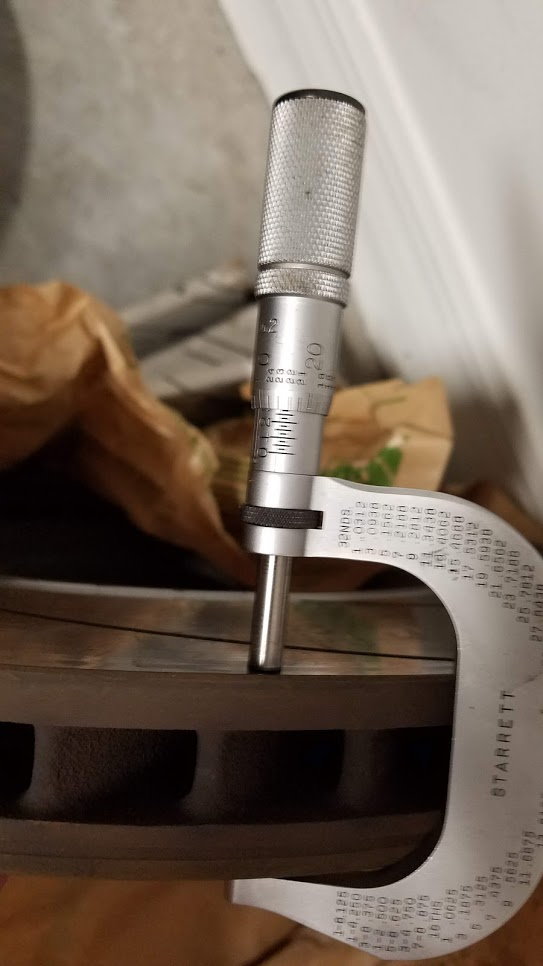
Last edited by Davew77; 02-20-19 at 12:19 PM.
#18
#19
Changed front and rear brakes at 47k miles. Rotors both front and rear had very little slot depth left. If the slots are gone, the rotors are below minimum thickness. Rear rotors and rear pads wear out at about the same time if you are running OEM rotors and pads.
Beware the anti-rattle springs. One of my rear pieces decided to shift after installation and was rubbing on the outer diameter of the rear rotor. Very annoying noise ensued. Easily fixed by repositioning the anti-rattle spring, but I really wasn't expecting this to happen.
Also, when replacing the rear rotors, be sure to disengage the parking brake and back off the parking brake shoes before trying to remove the rotor or you will damage the shoe retainers in the parking brake. This also means you need to adjust the parking brake shoes properly after installing the new rotors in the rear.
#20
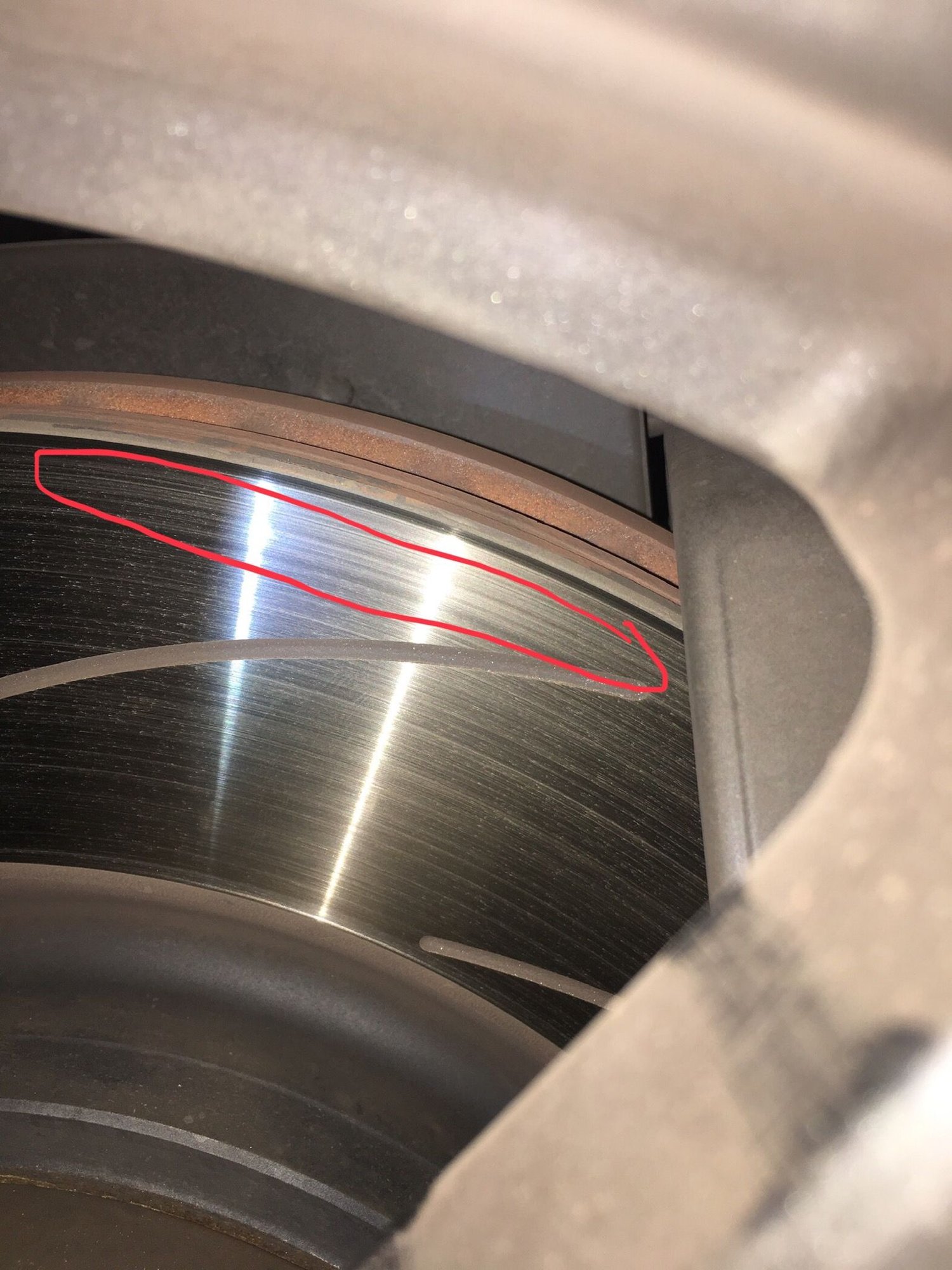
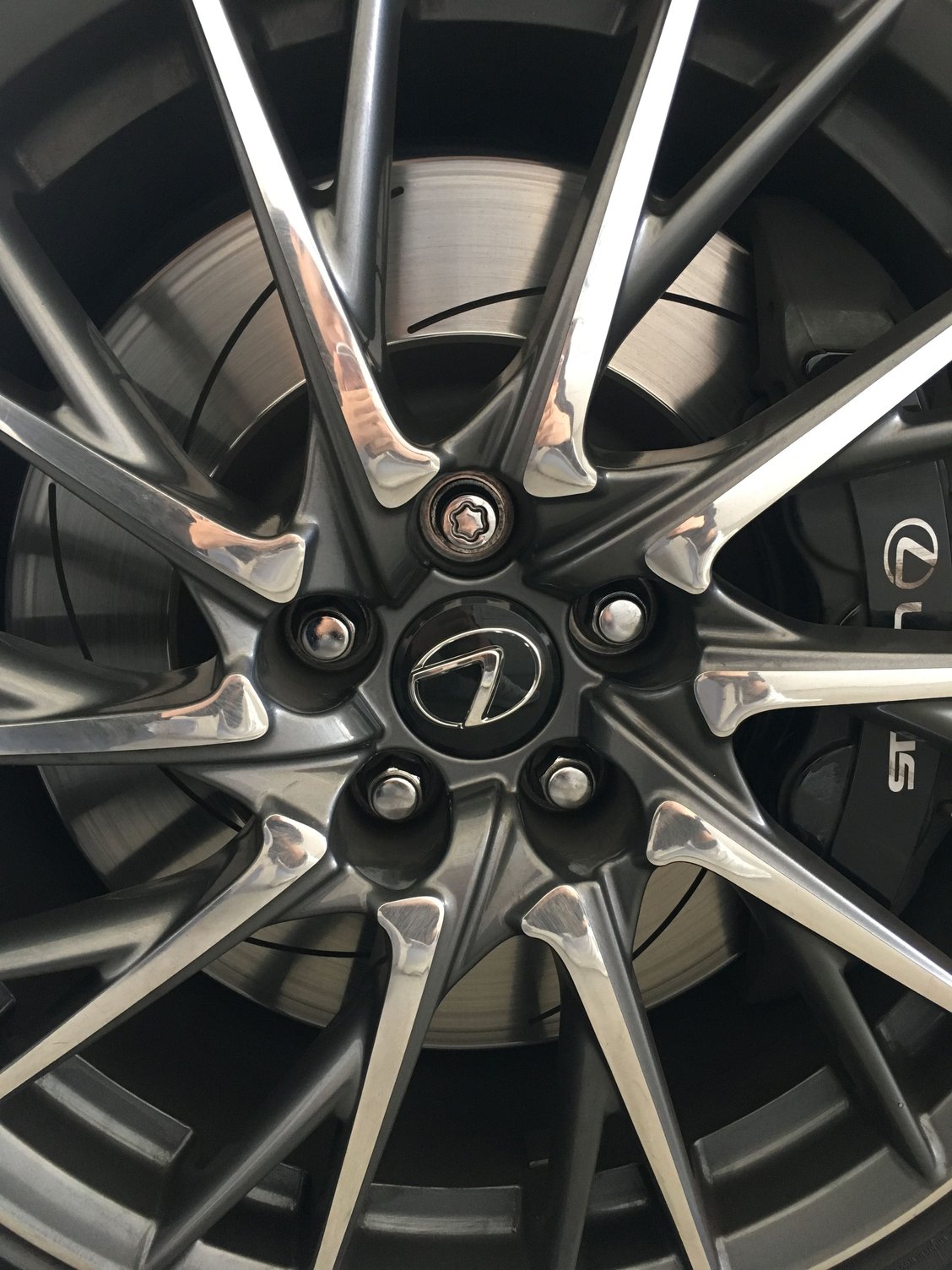
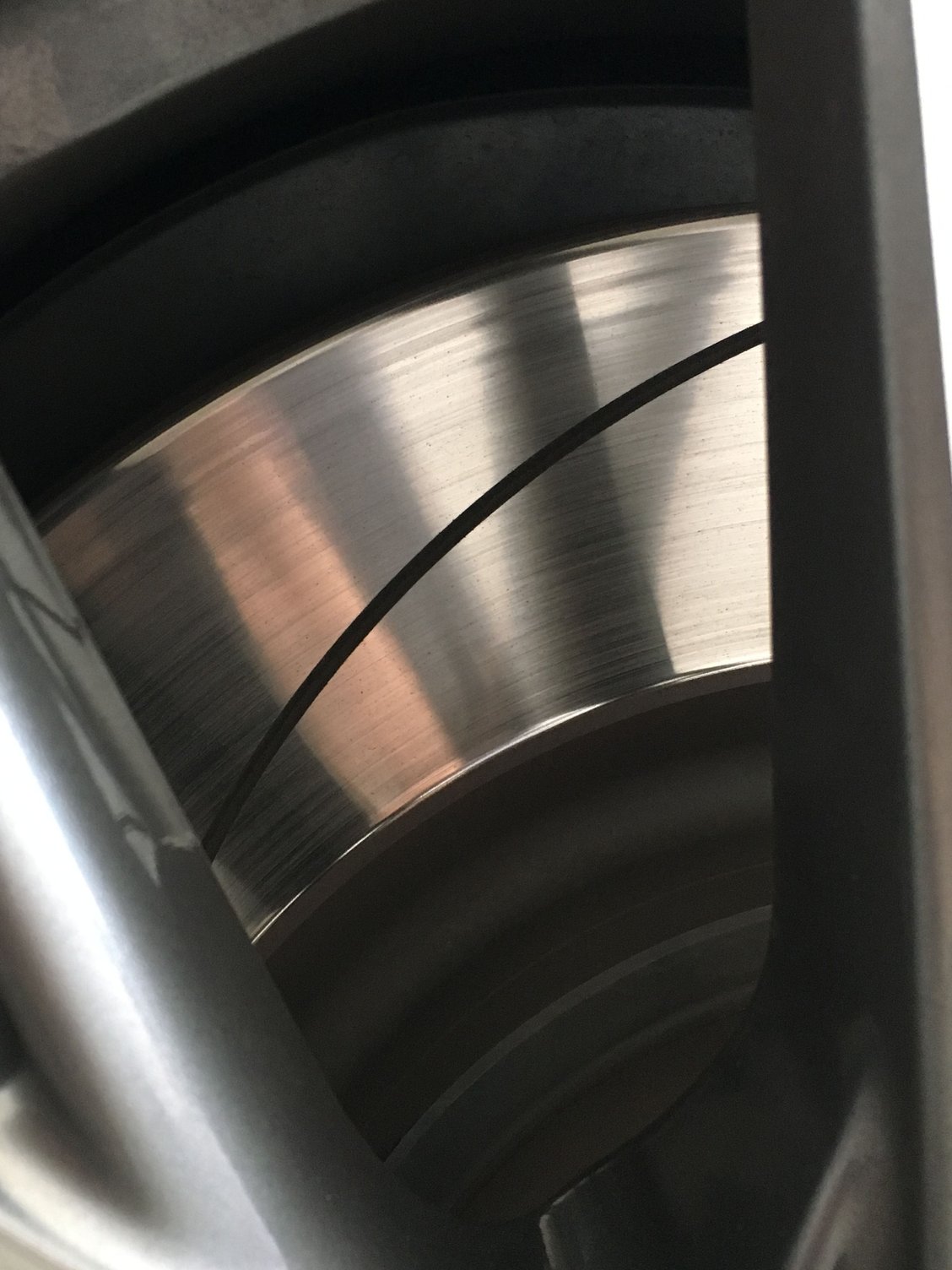
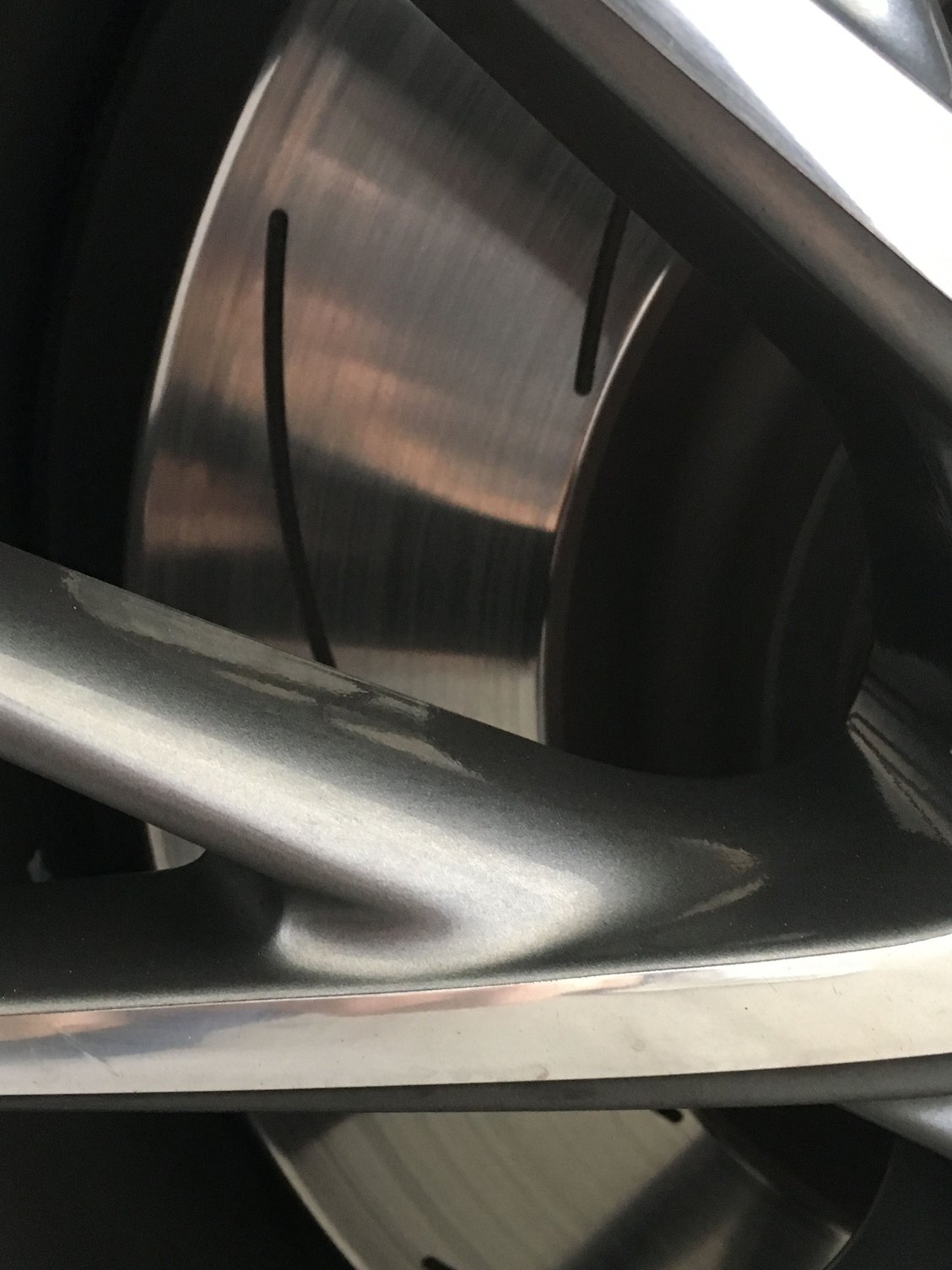
Why do you want to change the pads when they're barely 50% used?
Changed front pads when the sensors indicated the pads were worn at about 22k miles. There was 2x the minimum thickness on the pads when this happened. Rotors were still in fine shape, so new pads went in with new sensors - new pads, used rotors, no turning (ever - if rotors are so gouged they need to be turned, it's time to replace them instead), and everything worked perfectly until...
Changed front and rear brakes at 47k miles. Rotors both front and rear had very little slot depth left. If the slots are gone, the rotors are below minimum thickness. Rear rotors and rear pads wear out at about the same time if you are running OEM rotors and pads.
Beware the anti-rattle springs. One of my rear pieces decided to shift after installation and was rubbing on the outer diameter of the rear rotor. Very annoying noise ensued. Easily fixed by repositioning the anti-rattle spring, but I really wasn't expecting this to happen.
Also, when replacing the rear rotors, be sure to disengage the parking brake and back off the parking brake shoes before trying to remove the rotor or you will damage the shoe retainers in the parking brake. This also means you need to adjust the parking brake shoes properly after installing the new rotors in the rear.
Changed front pads when the sensors indicated the pads were worn at about 22k miles. There was 2x the minimum thickness on the pads when this happened. Rotors were still in fine shape, so new pads went in with new sensors - new pads, used rotors, no turning (ever - if rotors are so gouged they need to be turned, it's time to replace them instead), and everything worked perfectly until...
Changed front and rear brakes at 47k miles. Rotors both front and rear had very little slot depth left. If the slots are gone, the rotors are below minimum thickness. Rear rotors and rear pads wear out at about the same time if you are running OEM rotors and pads.
Beware the anti-rattle springs. One of my rear pieces decided to shift after installation and was rubbing on the outer diameter of the rear rotor. Very annoying noise ensued. Easily fixed by repositioning the anti-rattle spring, but I really wasn't expecting this to happen.
Also, when replacing the rear rotors, be sure to disengage the parking brake and back off the parking brake shoes before trying to remove the rotor or you will damage the shoe retainers in the parking brake. This also means you need to adjust the parking brake shoes properly after installing the new rotors in the rear.
#21
My brakes are making a terrible squeaky sound and I also hear grinding noises when braking softly and on top of that makes a sound when I let go of the brakes. Dealer said it’s touching the sensor and I have to get new pads and rotors replaced. I think my rotors has plenty of life left. I did touch the rotor and I felt slight bumpy grooves around it. Will I be okay with just replacing the pads?

The more aggressive brake compound inspires more confidence and makes the RCF much more manageable considering its' weight.
Last edited by konichiwa3; 03-10-19 at 01:17 AM.
#22
Any pad capable of locking the wheel will have zero difference in stopping distance. High friction pads feel better, but they don't actually stop any better. Where they shine is on repeated stops without fading. But for single stops, the pad compound makes no difference at all to stopping distance. Tire traction/road conditions make all the difference in stopping power.
The following users liked this post:
bob67 (03-11-19)
#23
You're the only one I know running that pad.
Been on track with them yet?
How long have you had them. Wondering about the longevity.
The endless Mx72 donít last that long for me. I pretty much run through a set of fronts each season.
Just swap to ME20 ones. Will see how they last.
So far only one track day. To me, they feel way better than the 72ís. Think itís the friction increase, which allows me to use less leg pressure, which gives me better modulation.
#24
It's been 2k miles since I changed these brakes. No ABS issues at all from changing the brake fluid without using Techstream.
As for the MX72 pads... I notice little difference over the stock pads in regards to braking power. But if anything they feel slightly better. I've been having a lot of fun in the Ozark mountains. There is virtually no dust compared to the stock pads and I haven't heard a single squeal yet.
As for wear on MX72 pads... I can't comment yet. But I don't know how they can be wearing faster when there is much less dust. Unless it just doesn't stick to things like the stock pads.
As for the MX72 pads... I notice little difference over the stock pads in regards to braking power. But if anything they feel slightly better. I've been having a lot of fun in the Ozark mountains. There is virtually no dust compared to the stock pads and I haven't heard a single squeal yet.
As for wear on MX72 pads... I can't comment yet. But I don't know how they can be wearing faster when there is much less dust. Unless it just doesn't stick to things like the stock pads.
#26
But that might also be the dot 4 fluid I put in...
#27
I think the key is not to look at a single stop, but multiple braking events. My coworkers asked me why the RC F has these massive 6 pot calipers in the front, and my opinion is that it is for repeated braking over and over (like in a race). Once the brakes get hot, the pads and the clamping force matter. I would agree that when they are cool, any pad that can lock up the rotor is the same.
#28
Any pad capable of locking the wheel will have zero difference in stopping distance. High friction pads feel better, but they don't actually stop any better. Where they shine is on repeated stops without fading. But for single stops, the pad compound makes no difference at all to stopping distance. Tire traction/road conditions make all the difference in stopping power.
I think the key is not to look at a single stop, but multiple braking events. My coworkers asked me why the RC F has these massive 6 pot calipers in the front, and my opinion is that it is for repeated braking over and over (like in a race). Once the brakes get hot, the pads and the clamping force matter. I would agree that when they are cool, any pad that can lock up the rotor is the same.
Are we saying at full lock you are achieving the shortest braking distance possible?
Why would lexus disclose that the alternative brake pads issued under TSB will reduce braking performance? Disclosure was not only for track situations but also street driving.
Koni,
You're the only one I know running that pad.
Been on track with them yet?
How long have you had them. Wondering about the longevity.
The endless Mx72 donít last that long for me. I pretty much run through a set of fronts each season.
Just swap to ME20 ones. Will see how they last.
So far only one track day. To me, they feel way better than the 72ís. Think itís the friction increase, which allows me to use less leg pressure, which gives me better modulation.
Mingo,
I haven't tracked with this brake setup yet (I actually have the XT970 along with the RB 2pc rotors) but they do get great reviews in the GTR, corvette and porsche forums by those who have tracked them.
You should talk to Warren the owner of Racing Brake and pick his brain. He is a very accessible gentleman.
The following users liked this post:
Mingofish (03-13-19)
#29
Your fluid choice has zero bearing on anything other than heat management. Some fluids boil at lower temperatures. There are a few fluids that slightly change feel - Brembo LCF is a good example as it has low compressibility compared to other fluids, but again, that's only pedal travel, not actual braking power.
Anything short of changing tires only changes the feel of the brakes, not the stopping distance in a single stop.
#30
I think the key is not to look at a single stop, but multiple braking events. My coworkers asked me why the RC F has these massive 6 pot calipers in the front, and my opinion is that it is for repeated braking over and over (like in a race). Once the brakes get hot, the pads and the clamping force matter. I would agree that when they are cool, any pad that can lock up the rotor is the same.
The following users liked this post:
siredward (03-15-19)


